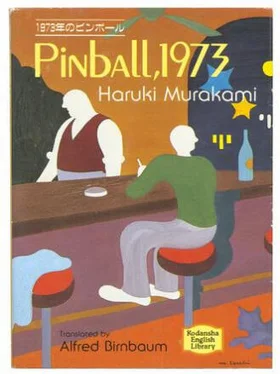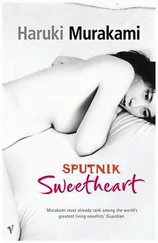Haruki Murakami - Pinball, 1973
Здесь есть возможность читать онлайн «Haruki Murakami - Pinball, 1973» весь текст электронной книги совершенно бесплатно (целиком полную версию без сокращений). В некоторых случаях можно слушать аудио, скачать через торрент в формате fb2 и присутствует краткое содержание. Издательство: Unknown publisher, Жанр: Современная проза, на английском языке. Описание произведения, (предисловие) а так же отзывы посетителей доступны на портале библиотеки ЛибКат.
- Название:Pinball, 1973
- Автор:
- Издательство:Unknown publisher
- Жанр:
- Год:неизвестен
- ISBN:нет данных
- Рейтинг книги:3 / 5. Голосов: 1
-
Избранное:Добавить в избранное
- Отзывы:
-
Ваша оценка:
- 60
- 1
- 2
- 3
- 4
- 5
Pinball, 1973: краткое содержание, описание и аннотация
Предлагаем к чтению аннотацию, описание, краткое содержание или предисловие (зависит от того, что написал сам автор книги «Pinball, 1973»). Если вы не нашли необходимую информацию о книге — напишите в комментариях, мы постараемся отыскать её.
Pinball, 1973 — читать онлайн бесплатно полную книгу (весь текст) целиком
Ниже представлен текст книги, разбитый по страницам. Система сохранения места последней прочитанной страницы, позволяет с удобством читать онлайн бесплатно книгу «Pinball, 1973», без необходимости каждый раз заново искать на чём Вы остановились. Поставьте закладку, и сможете в любой момент перейти на страницу, на которой закончили чтение.
Интервал:
Закладка:
The well-digger had two sons, both of whom left the area without following in his footsteps. Nobody went near his house after that, and abandoned, it slowly but surely rotted out. And ever since, sweetwater wells have been hard to come by in the area.
I like wells, though. Every time I see a well, I can't resist tossing a rock in. There's nothing as soothing as the sound of a pebble hitting the water in a deep well.
* * *
It was all her father's doing that Naoko's family moved into the area in 1961. He had been a close friend of the dead painter, not to mention, of course, that her father liked the place.
He apparently had been a well-respected scholar of French literature, when all of a sudden, while Naoko was still in elementary school, he quit the university and thereafter spent his time leisurely translating curious old texts and the like. Fallen angels and debauched priests, diabolists, vampires, tracts on sordid and sundry topics. I don't really know the details. Only once did I come across his photograph, in a magazine. According to Naoko, he'd led something of a colorful and offbeat life in his youth, and the photograph betrayed more than a hint of that style about him. In it he wore a hunting cap and black-rimmed glasses, his piercing gaze focused a few feet above the camera. He must have seen something.
* * *
Back around the time Naoko and her family moved in, something of a colony of these cultured eccentrics had congregated in the area. By all accounts, it had been like one of the Siberian penal colonies for exiled ideological criminals in Imperial Russia.
I've read a little about those penal colonies in Trotsky's memoirs, but for some reason, the only passages I remember clearly had to do with cockroaches and reindeer. So here goes about the reindeer.
It seems Trotsky escaped from a penal colony under cover of night by stealing a reindeer sleigh. The four reindeer raced headlong across the silver expanse of frozen tundra, their breaths turning to white mist in the cold air, their hooves churning up the virgin snow. Two days later when they reached a train station, the reindeer keeled over from exhaustion, never to get up again. Trotsky hugged the dead reindeer and made a vow, tears streaming from his eyes. Whatever it takes, said he, I'll bring justice and ideals, and above all, revolution to the nation.
And to this very day, standing in Red Square is a bronze statue of the four reindeer. One facing east, one north, one west, and one south. Even Stalin couldn't bring himself to tear down these reindeer. Visitors to Moscow should be sure to go to Red Square early Saturday mornings. That's when rosy-cheeked middle school children come out, breaths all white in the cold, and mop down the reindeer.
But to continue about the local colony: The group purposely avoided the more accessible flatland near the station, choosing instead places back in the foothills to build their dream houses. Each and every one of these had incredibly spacious grounds, with ponds and hillocks and whole groves of trees left intact within their boundaries. One estate even had its own brook teeming with real live sweetfish.
These free spirits would wake to the early morning cooing of turtle doves, tread on beechnuts while strolling the gardens, stop to take in the morning light cascading through the leaves.
But times changed, and little by little the exponential sprawl of suburbanization made inroads here. Right around the time of the Tokyo Olympics. The vast acreage of mulberries that once spread out below the hills like a fertile sea was bulldozed into a dark, scarred wasteland, which gradually took the shape of your regular tract town, fanning out from the station.
The new residents were for the most part middleclass commuters. They'd spring up like clockwork at a little after five, have barely enough time to wash their faces before they'd be off to board their train, and return late at night looking half-dead.
Sunday afternoons were the only times they could relax enough to appreciate their new town and homes. Also, as if by consensus, most had dogs. The dogs interbred, and strays were everywhere. That's what Naoko meant when she said there used not to be a dog around for miles.
* * *
One whole hour I waited, and not a dog showed. Ten cigarettes I lit and crushed out. I walked to the middle of the platform, and took a drink of the crisp, cold water from the faucet there. Still no dog.
To the side of the station was a large pond. A long, serpentine pool, as if they'd dammed up a stream. The banks were overgrown with tall marsh grasses, and from time to time a fish broke the surface of the water. Spaced out along the banks sat some men, tightlipped, fishing lines cast into the cloudy water. The lines never so much as twitched; they might as well have been silver needles stuck into the water. Yet there under the lazy rays of the spring sun, a big white dog that one of the men had probably brought along was eagerly sniffing around in the clover.
When the dog came within ten yards of me, I leaned over the station fence and called to it. The dog looked up and gazed at me with the most sorrowful light brown eyes, then wagged its tail a couple of times. I snapped my fingers, and the dog came over, thrust its nose through the fence and licked my hand with its long tongue.
"Hey, come on in," I called to the dog as it withdrew. The dog turned away hesitantly, then resumed wagging its tail as if the message hadn't quite gotten through.
"Come on in. I'm tired of waiting."
I fished a stick of chewing gum out of my pocket, and held up the wrapper for the dog to see. The dog stared at the gum for a while before making up its mind to crawl under the fence. I gave the dog a few pats on the head, rolled the gum up into a ball in the palm of my hand, and chucked it toward the other end of the platform. The dog dashed off straight as an arrow.
I went home satisfied.
* * *
On the train ride back, I told myself over and over again, it's all over with now, you got it out of your system, forget it. You got what you came for, didn't you? Yet I couldn't get it out of mind, that place. Nor the fact that I loved Naoko. Nor that she was dead. After all that, I still hadn't closed the book on anything.
* * *
Venus is a sweltering planet covered with clouds. Half the inhabitants die young from the heat and humidity. It's a feat just to live thirty years. But by the same measure, that makes them all the more tenderhearted. Every Venusian loves all Venusians. They don't hate or discriminate or hold grudges against anyone. They don't even curse. No murders or fighting, only love and consideration.
"Even if, say, someone dies, we don't feel sad," said the guy from Venus, an ultra-quiet type. "We'd rather just show that much more love while the person's alive. That way, there's no regret afterward."
"So it's like you get your loving done ahead of time?"
"Hmm ... the words you folks use sound so strange to me," he said, shaking his head.
"And everything really comes off with no hitches?" I asked.
"If it didn't," he said, "Venus would be buried in sorrow."
* * *
I returned to the apartment to find the twins in bed, snug under the covers like two sardines in a tin, giggling away to themselves.
"Welcome back," said one of them.
"Where did you go?"
"Train station," I said, loosening my tie, and snuggled in between them. I was bushed.
"What station, where?"
"What did you go for?"
"A station a long ways away from here. Went to see a dog."
"What kind of dog?"
"You like dogs?"
"A big white dog, it was. And no, I'm really not so crazy about dogs."
I lit up a cigarette, and until I'd finished, the neither of them said a word.
"You sad about something?" one of them asked.
Читать дальшеИнтервал:
Закладка:
Похожие книги на «Pinball, 1973»
Представляем Вашему вниманию похожие книги на «Pinball, 1973» списком для выбора. Мы отобрали схожую по названию и смыслу литературу в надежде предоставить читателям больше вариантов отыскать новые, интересные, ещё непрочитанные произведения.
Обсуждение, отзывы о книге «Pinball, 1973» и просто собственные мнения читателей. Оставьте ваши комментарии, напишите, что Вы думаете о произведении, его смысле или главных героях. Укажите что конкретно понравилось, а что нет, и почему Вы так считаете.












